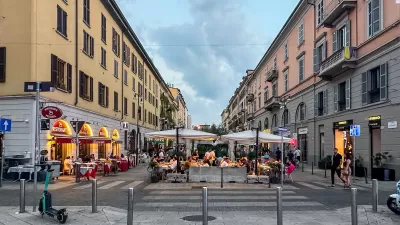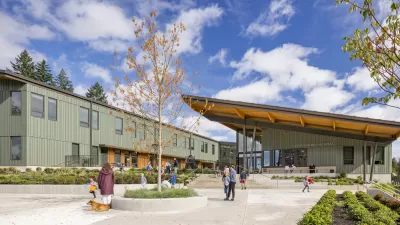A recent conference hosted by the Lincoln Institute of Land Policy focused on how planners around the world are designing urban areas that respond to the impacts of climate change.
"The plans for the 2008 Beijing Olympics are notable for their extra security amid human-rights protests. But the 2012 London Olympics' park plans are notable in that they consider a climate-changed future, in which flooding may worsen and cities must minimize carbon emissions.
London's summer-games site straddles the polluted Lea River on the east end of the city, now a moribund industrial area dotted with depressed neighborhoods. The planners looked at climate models and recognized that the area, known as the Lower Lea Valley, would likely be carrying higher flood waters from intensifying rainstorms.
Jason Prior, European regional president for the planning firm EDAW, explained one consequence of this finding at a conference on Friday: the planners ran hydrological models to determine how to widen the river and design new bridges to accommodate the higher flows. "You survey the river systems, then project forward the impact of different flow conditions, and you add the amounts the climate models are giving you," Prior said after a forum on climate change and cities at the Lincoln Institute of Land Policy, in Cambridge, MA. "You then fine-tune the channel's cross sections, change design of bridge abutments, and design wetlands to catch the extra amounts." Site work has already begun."
FULL STORY: How to Plan for Climate Change

Planetizen Federal Action Tracker
A weekly monitor of how Trump’s orders and actions are impacting planners and planning in America.

Restaurant Patios Were a Pandemic Win — Why Were They so Hard to Keep?
Social distancing requirements and changes in travel patterns prompted cities to pilot new uses for street and sidewalk space. Then it got complicated.

Map: Where Senate Republicans Want to Sell Your Public Lands
For public land advocates, the Senate Republicans’ proposal to sell millions of acres of public land in the West is “the biggest fight of their careers.”

Maui's Vacation Rental Debate Turns Ugly
Verbal attacks, misinformation campaigns and fistfights plague a high-stakes debate to convert thousands of vacation rentals into long-term housing.

San Francisco Suspends Traffic Calming Amidst Record Deaths
Citing “a challenging fiscal landscape,” the city will cease the program on the heels of 42 traffic deaths, including 24 pedestrians.

California Homeless Arrests, Citations Spike After Ruling
An investigation reveals that anti-homeless actions increased up to 500% after Grants Pass v. Johnson — even in cities claiming no policy change.
Urban Design for Planners 1: Software Tools
This six-course series explores essential urban design concepts using open source software and equips planners with the tools they need to participate fully in the urban design process.
Planning for Universal Design
Learn the tools for implementing Universal Design in planning regulations.
Heyer Gruel & Associates PA
JM Goldson LLC
Custer County Colorado
City of Camden Redevelopment Agency
City of Astoria
Transportation Research & Education Center (TREC) at Portland State University
Camden Redevelopment Agency
City of Claremont
Municipality of Princeton (NJ)





























